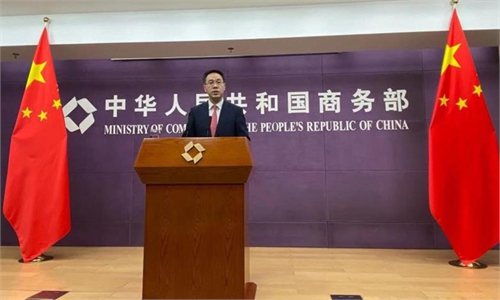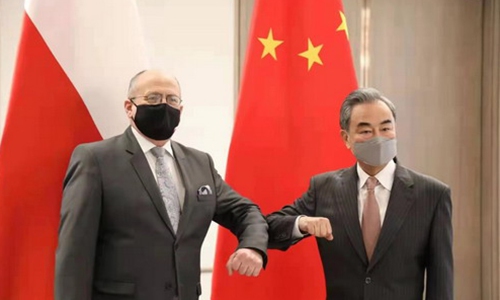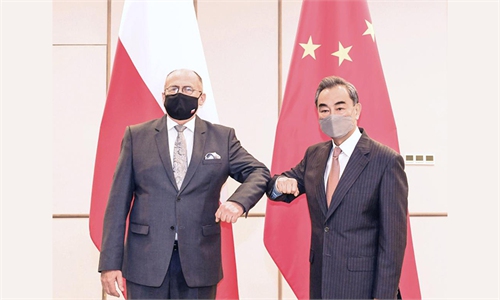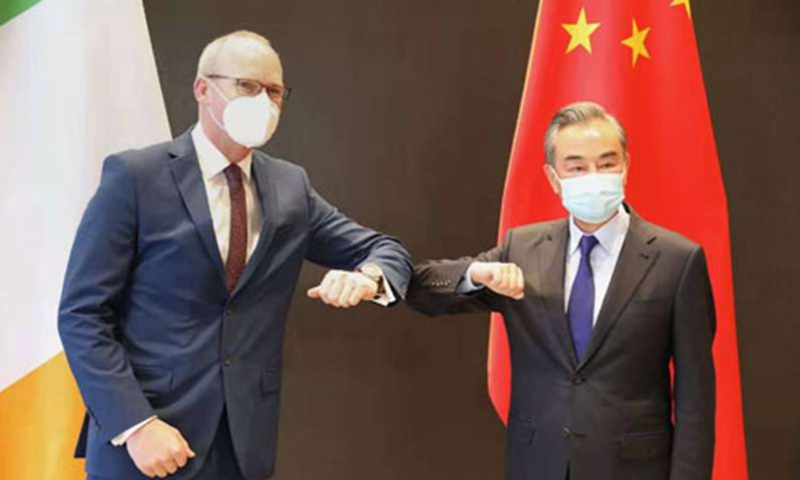
Chinese State Councilor and Foreign Minister Wang Yi (right) and Irish Minister for Foreign Affairs and Minister for Defense Simon Coveney Photo: website of Chinese Foreign Ministry
A wide-ranging consensus after in-depth and candid exchanges between a senior Chinese official and foreign ministers from four European countries fully underscored the whole picture of the China-EU relationship, which won't be limited by the current deteriorating situation between China and the European Parliament that jeopardizes the interests of the continent in echoing a US-led ideological battle against China, experts said.
Chinese State Councilor and Foreign Minister Wang Yi wrapped up the meetings with foreign ministers from Poland, Serbia, Ireland and Hungary, calling it a strategic communication between China and Europe in the face of the new international situations and new challenges, according to a statement on the website of the Chinese Foreign Ministry on Tuesday.
"We all agree that we should pay attention to and calmly reflect on the current difficulties in China-Europe relations," Wang said, noting that China is willing to continue exchanges and dialogue with Europe, with the latest in-depth communication of great practical significance.
These European countries, which have been working closely with China, also played a positive role in helping stabilize China-EU ties in spite of growing divergences between the two sides, Chinese experts said, noting that they should also be considered as "real models" with their success stories to make European policymakers reconsider their own China-related policies.
It is still the shared aspiration of European countries to strengthen cooperation with China, Irish Minister for Foreign Affairs and Minister for Defense Simon Coveney said at the meeting, stressing that both sides will make irrevocable mistakes with historic consequences if each side goes its own way due to certain man-made obstacles.
Hungary, which has been cooperating closely with China in fighting against the COVID-19 pandemic, especially in vaccine supply and production, also expressed its firm support for China-EU ties as well as for the EU-China Comprehensive Agreement on Investment (CAI).
The pact has been suspended by the European Parliament for tit-for-tat measures over China's Xinjiang policy, which was also seen as a major obstacle for the two sides, when the US has been playing an active role in influencing Europe to take a hard-line anti-China stance.
Over the weekend, positive voices also emerged in meetings between the Chinese official with Serbian Foreign Minister Nikola Selakovic and one with Poland's Minister of Foreign Affairs Zbigniew Rau, with officials calling for both China and Europe to calm down and properly handle their differences.
As relations between China and the EU experienced hiccups over the latest freezing of the CAI, Lithuania, which is a relatively small market in China and the Central and Eastern Europe Countries (CEEC) cooperation, said it had withdrawn from the 17+1 mechanism between China and the CEEC.
This raised doubts over whether China and Europe are heading toward a larger scale of confrontation, as the European legislative body took the lead in intensifying the ideological competition with Beijing.
Emphasizing that China and Europe remain comprehensive strategic partners signaled that China won't be willing to limit China-EU ties within the scope of China- the European Parliament, and it's also necessary to fully motivate the EU member states to strive for a balance between China and Europe when they confront difficulties, Cui Hongjian, director of the Department of European Studies at the China Institute of International Studies, told the Global Times on Tuesday.
"The latest positive interactions between top diplomats also showed the China-EU relationship has many dimensions, and there are different opinions about China inside the bloc. A clear message was delivered to the international community: Limited obstacles and problems won't become the mainstream issue between the two sides," Cui said.
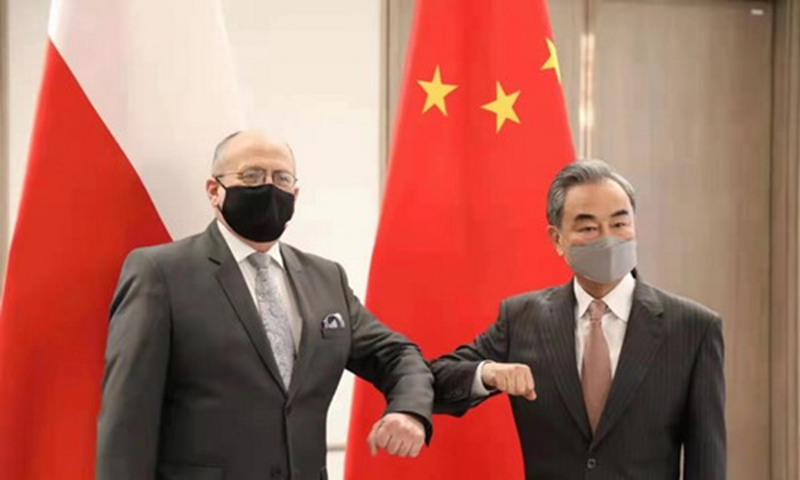
Chinese State Councilor and Foreign Minister Wang Yi (right) Wang Yi and Poland's Minister of Foreign Affairs Zbigniew Rau Photo: website of Chinese Foreign Ministry
Except for Serbia, the other three are all EU member states. As "iron-clad" friend and trustworthy partners of China, countries including Serbia and Hungary have been enhancing cooperation with China during the anti-COVID-19 fight, generating growing benefits for their own people.
Hungary plans to produce Chinese Sinopharm's COVID-19 vaccine as well as a locally developed shot in a planned $193 million vaccine plant, and it is also the only EU country to inoculate its people with China's Sinopharm vaccines, Reuters reported on Tuesday.
The plant is expected to make the European country self-sufficient in vaccine production from the end of 2022, the report said, citing the country's state news agency MTI.
Also, Serbia has vaccinated more than 45 percent of its adult population, a rate higher than most European countries, the Xinhua News Agency reported, citing the Serbian government. With growing confidence in reining in the epidemic, the trust in Chinese-made vaccines has helped its early recovery.
China not only attaches importance to West European countries - France and Germany -- but also to small and medium-sized Central and East European countries that often have a changing attitude toward China, Liu Zuokui, a research fellow on European studies at the Chinese Academy of Social Sciences in Beijing, told the Global Times on Tuesday.
"We also need to exploit on those countries that change their policies to cultivate more positive room for the China-Europe relationship," he said.

